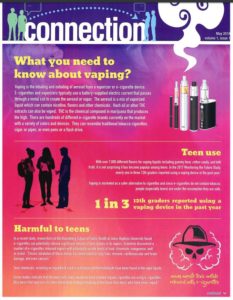Dear Parents and Guardians,
I encourage you to review the documents I have provided below pertaining to vaping. Youth use of electronic cigarettes “has reached epidemic proportion,” the leader of the Food and Drug Administration said this past Wednesday. One survey indicated 63% of Juul users ages 15-24 were not aware the product “always contains nicotine.” Vaping can quickly lead to nicotine addiction, as per a 2016 Surgeon General’s report, which may lead some teens to start smoking traditional cigarettes. There is also the concern that the devices may be used to consume marijuana. In addition, many flavor cartridges do not provide a complete ingredients list, leaving students unsure of what they are inhaling.
There is no research about the long-term effects of vaping.The potential harm to students alarms me. I encourage you to speak candidly with your child regarding this information. Please understand that vaping and vaping products are not allowed on school premises.
Thanks in advance for discussing this important health information with your son/daughter.
Sincerely,
David Snider, CHS Principal
, September 12, 2018
Teen Vaping Has Hit ‘Epidemic Proportions,’ FDA Leader Says in Enforcement Call
Youth use of electronic cigarettes “has reached an epidemic proportion,” the leader of the Food and Drug Administration said Wednesday.He gave the manufacturers of popular vaping devices, like Juul, 60 days to make plans to limit their sales to minors or risk seeing their products pulled from the market pending new regulations. He also announced new enforcement actions against retailers who sell the products.
“We’re committed to the comprehensive approach to address addiction to nicotine that we announced last year,” FDA Commissioner Scott Gottlieb said. But at the same time, we see clear signs that youth use of electronic cigarettes has reached an epidemic proportion, and we must adjust certain aspects of our comprehensive strategy to stem this clear and present danger.
Vaping products are popular among adults who use them as an off-ramp to quit smoking traditional cigarettes. But public health experts warn they have a thriving secondary market among young people, who may become addicted to the nicotine devices even if they have never smoked a traditional cigarette.
As Education Week has reported, schools have struggled to detect small vaping devices, like the Juul, and to keep students from carrying them — or even using them — in their hallways,. bathrooms and classrooms.
Among the concerns Gottlieb highlighted: Some e-cigarette flavors seem targeted at young people, and e-cigarette companies that sell their products online may be prone to “straw purchases,” in which one person buys a large quantity of devices to offer them for resales to underage users.

